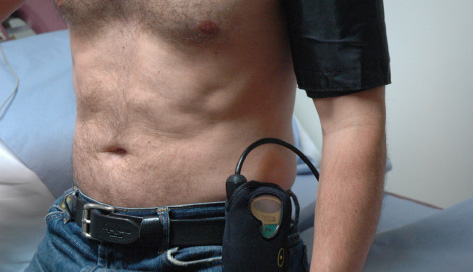

24hr Blood Pressure monitoring
What is involved with 24hr
Blood Pressure monitoring?
Will it be uncomfortable?
Can I continue normal activities whilst
being monitored?
What are the benefits of having 24hr
Blood Pressure monitoring?
Are there any risks involved?
What alternatives do I have?
What can I expect afterwards?
How will it help my GP to advise
on my treatment?
What is involved with 24hr Blood Pressure monitoring?You will be fitted with a cuff to wear around your arm which is attached to a small machine that records your blood pressure at regular intervals over a period of time, usually 24hrs. The cuff will inflate regularly during the day and night. You will be asked to keep a diary or a log of your activities while you are wearing the monitor. Will it be uncomfortable?It may be slightly uncomfortable as the cuff inflates. It helps if you relax your arm down by your side whilst it inflates, as this will lessen the chance of the monitor having to retry and helps it to be more accurate. Most people get used to wearing the monitor very quickly. Can I continue normal activities whilst being monitored?You are advised to keep to your normal routine whilst wearing the monitor but avoid taking a bath or a shower as you must not get the monitor wet. What are the benefits of having 24hr Blood Pressure monitoring? Having your blood pressure monitored in your own environment, over a period of time can provide your GP with a more accurate assessment than a single recording taken during a clinic visit. Monitoring blood pressure over a period of time is also useful to assess patients who are known to have high blood pressure and determine how effective their treatment is. Are there any risks involved?There are no known risks involved with blood pressure monitoring. What alternatives do I have?Not everyone with high blood pressure or suspected high blood pressure will need 24hr monitoring. Your GP may decide to monitor your blood pressure at regular intervals in their clinic if it is well controlled. What can I expect afterwards?You will be informed what time to remove the cuff the following day and asked to return the monitor and diary to the Heart Test clinic. The electronically recorded information is then analysed by a computer and reported. The results are forwarded to your Consultant or GP who will interpret them and give you the result at your next appointment with them. How will it help my GP to advise on my treatment?The normal blood pressure rises in situations of stress and excitement. Most people have no symptoms of having high blood pressure but we know that these people with persistent higher ranges of resting blood pressure have a higher rate of stroke and heart attacks. We also know that lowering the blood pressure can reduce the incidence of these complications. However some people find visiting the GP stressful and the blood pressure recorded then is untypically high. Recording the blood pressure during normal activities can give your GP information about whether your blood pressure is in the acceptable normal range, or is high, and whether it is responding to the treatment prescribed. 
|